The right wing and Facebook: partners in narrative control
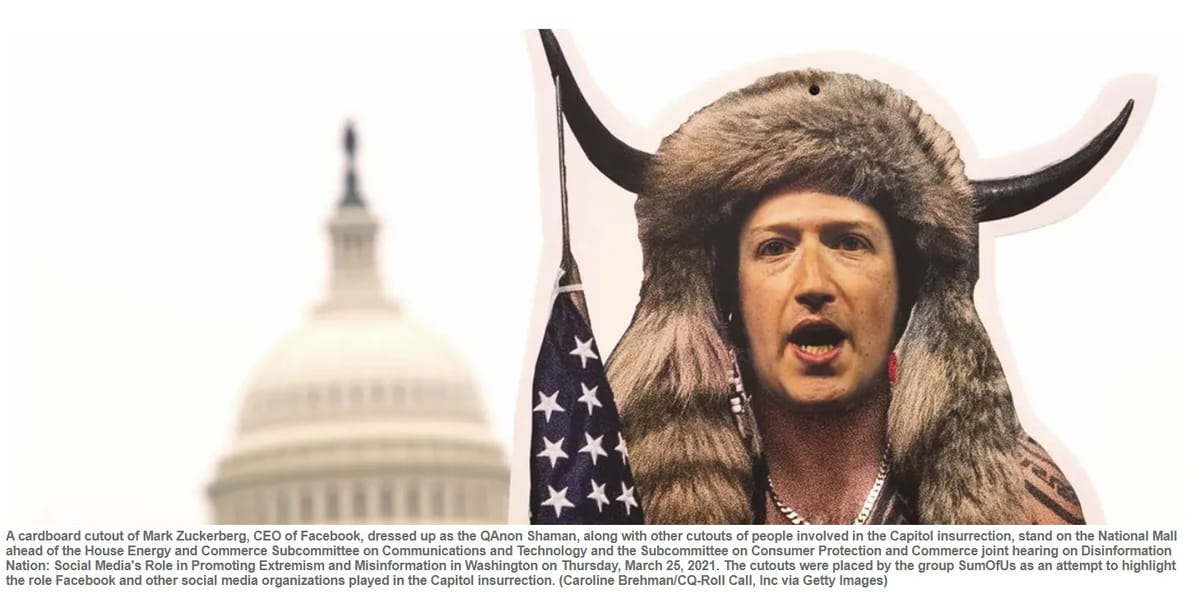
If you’ve followed either Jordan or Morgan on social media, you’ll know we have a history of getting thrown off social media platforms. Repeatedly.
We started using our own Facebook and Twitter accounts to critique corruption in Ontario in 2020, especially related to COVID. In the years since, we have six suspended Twitter accounts between us, and have been suspended from Facebook a number of times.

It’s not controversial any more to suggest that a person’s social media use shapes their perception of reality. In 2023, four peer reviewed studies confirmed that liberals and conservatives live in political news bubbles online, and that changing an algorithm substantially changes what people see and how they behave online.
In general, conservatives engage more frequently and enthusiastically with political content online. Conservatives are the main consumers of websites that Facebook flags as untrustworthy and inaccurate, but changing Facebook’s algorithm to reduce engagement with this type of content would have big business implications. Meta (the parent company of Facebook, Instagram and Whatsapp) sells advertising based on this engagement, which makes up nearly all of Meta’s $116 billion in annual revenue.
What is less understood by most social media users is how closely the social media platforms control what users are allowed and not allowed to see, by censoring and suppressing the content users share.
Over the last two decades, social media has become the default “public square” and the primary place for information sharing amongst individuals and groups. Few people have escaped the clutches of the social media giants. Facebook is by far the most popular social network in Canada. In 2023, there were about 31 million Canadian Facebook users, of a population of about 39 million people, meaning most Canadians have a Facebook account.
As traditional news business models disintegrated (due, in part, to loss of advertising revenue to Facebook, Google and YouTube), Facebook became the platform for everything. Once a website where you could keep tabs on your cousins, it was now a messaging service, a shopping site, a place to organize groups, and a news service. As mainstream news outlets struggled to get viewers/readers to their own websites, Facebook became their default distribution service to reach their audience.
Over time, this consumption pattern became cemented. By June of 2023, 66% of Canadians said they got their news from Google and 56% said Facebook was their primary source of news. (This ratio changed drastically in the summer of 2023 with the passing of Bill-C18, known as the Online News Act, but that’s a story for another day. Rest assured, removing news from Facebook was a big win for those who benefit from an uninformed constituency.)
Facebook users (and social media users in general) have little understanding about how much data the social platforms collect from them, and how that data is used. Most people understand their personal data is being used to sell them goods and services, but the social media giants have long used their oceans of data and their ubiquity for more political ends.
Readers who have followed us online know we refer to Facebook and Twitter as tools of the #IDUPlaybook. IDU, the International Democracy Union, is an international mutual support association of right wing political parties, currently chaired by Stephen Harper. (We wrote a primer about the IDU, if you want to catch up.)
The 80 or so member parties of IDU include the Conservative Party of Canada, the UK Tories, the US Republicans and the governing parties of Hungary, Korea, Argentina, Sweden, New Zealand, Greece, Finland, Serbia and Sri Lanka, among others. Netanyahu’s Likkud party is also a member, and member parties have been vocal about their unified support of Israel.
The Cambridge Analytica scandal, which began coming to light in 2018, was a window into the intersection of right wing political operatives and Facebook. In the 2010s, personal information from tens of millions of Facebook users was collected by the firm to be used for political advertising. Co-founded by Trump’s strategist (and Munk Debate guest), Steve Bannon, with financial backing from Republican donor Robert Mercer, Cambridge Analytica sought to leverage data-driven technology to push voters towards Bannon’s vision of America. (Previously pardoned by Trump, Bannon will head to prison on July 1 for contempt of Congress.)
Cambridge staffers described Bannon’s company as a “weapon of psychological warfare”, claiming that the parent company had earlier worked on government and military contracts that aimed to change foreign populations’ behaviours. Though Cambridge Analytica’s role in electing Trump is well-known, the company also advised the “Leave” campaign for Brexit. (This document outlines Cambridge’s Analytica’s proposed “workflow and methodology” for the Leave campaign.) Lord Daniel Hannan, widely regarded as the man behind Brexit, is vice chair of the IDU, supporting IDU chairman, Stephen Harper.
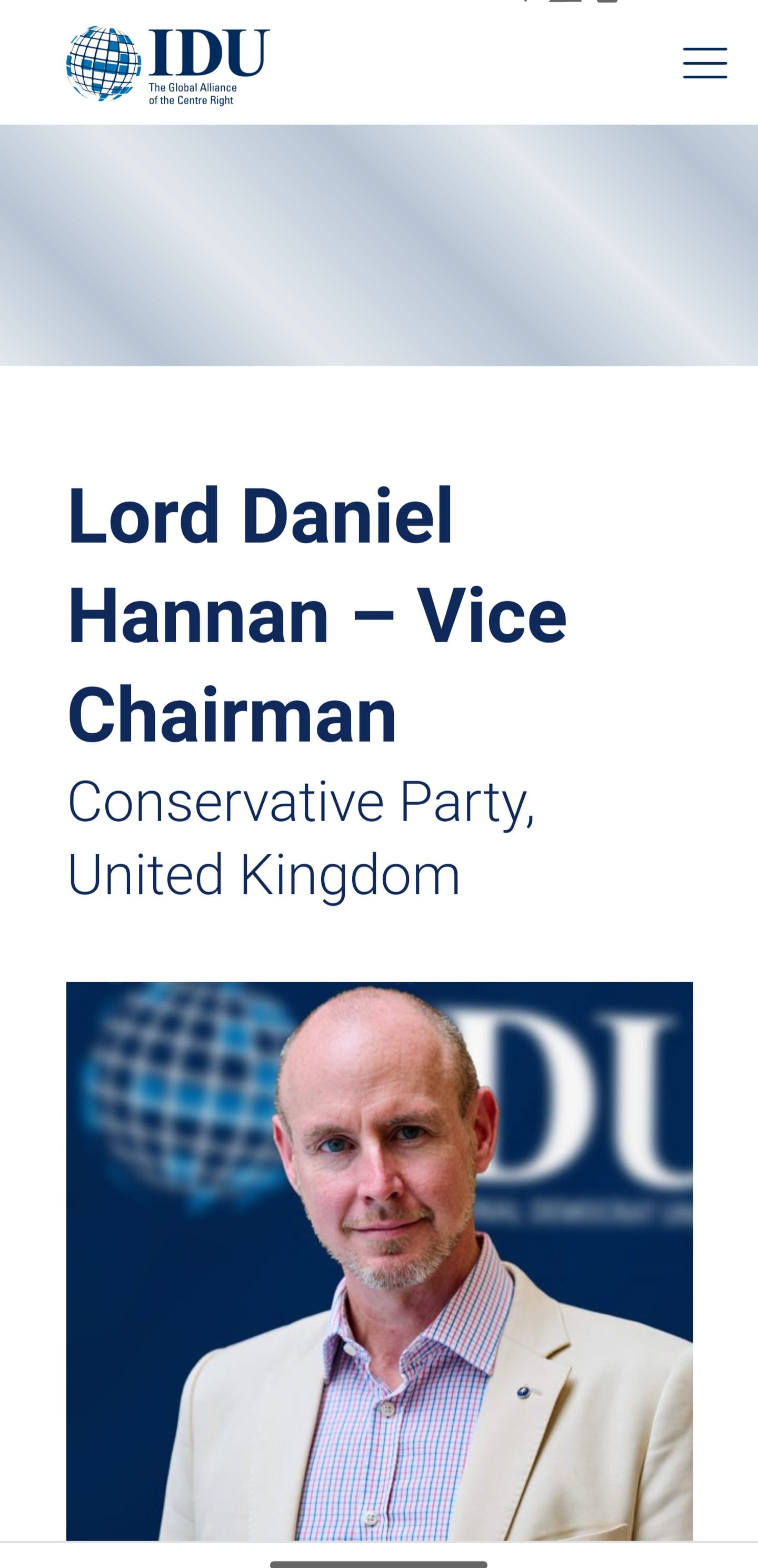
Facebook apologized for its role in the data harvesting that fueled the scandal, and CEO Mark Zuckerberg testified in front of Congress. Facebook was fined $5 billion by the US Federal Trade Commission for privacy violations, and was required to pay a £500,000 fine to the UK Information Commissioner’s Office for exposing the data of Facebook users. Zuckerberg rejected calls from Democrats to break up the company, saying Facebook is a “a great American success story,” adding “I don’t think it’s a very American tradition to start penalizing success.”
In 2021, a Facebook whistleblower, later revealed to be an ex-employee, accused the company of relaxing its security safeguards for the 2020 American election, leading Facebook to become the most important organizing and misinformation platform for the January 6th attack on the U.S. Capitol. The whistleblower also alleged Facebook knowingly contributes to political polarization in the United States.
Facebook also served as an organizing and misinformation platform for the 2022 “Freedom Convoy”, Canada’s version of the January 6th insurrection. With over 360,000 followers, the event’s main Facebook page is still active, and the organizers’ use of Facebook was key evidence in the trial of convoy organizers, Chris Barber and Tamara Lich. The Crown guided the court through 212 pages of posts and videos from the event’s Facebook page during the trial.
When it comes to Israel, Facebook (and parent company, Meta) is a critical ally. Human Rights Watch alleges that Meta’s policies have silenced voices in support of Palestinian human rights since October 7, 2023. The organization found that censorship of content related to Palestine on Instagram and Facebook is “systemic and global.”
In February, a group of 73 international civil society organizations, including Independent Jewish Voices (IJV) Canada, wrote to Meta claiming the company was restricting legitimate political debate about Israel and Gaza. In May, Meta employees published an open letter accusing Meta of removing “any open support for our Palestinian colleagues or the millions facing a humanitarian crisis in Palestine” on company forums.
In addition to providing useful censorship and suppression of information, there are claims that Meta is actively aiding Israel’s attacks on Gaza. Middle East Monitor reported that Israel’s artificial intelligence-aided system, Lavender, identifies bombing targets in Gaza by tracking their WhatsApp contacts. Israeli officials have admitted to targeting Gazans while they are at home with their families, including their children, in order to eliminate extended families. WhatsApp is owned by Meta.
Former Canadian Prime Minister and IDU chairman, Stephen Harper, also controls a fund which is the main investor in Corsight, an Israeli company that developed AI-based facial recognition technology used by the IDF to target Palestinians.
The Canadian branches of the major social media platforms have been run almost exclusively by ex-staffers of Stephen Harper for years. Rachel Curran, head of public policy for Meta Canada, was key to Facebook’s decision to stop carrying news in Canada. Curran worked in Stephen Harper’s government for six years, including four years as his director of policy, and she also worked for Harper’s consulting company, Harper & Associates.
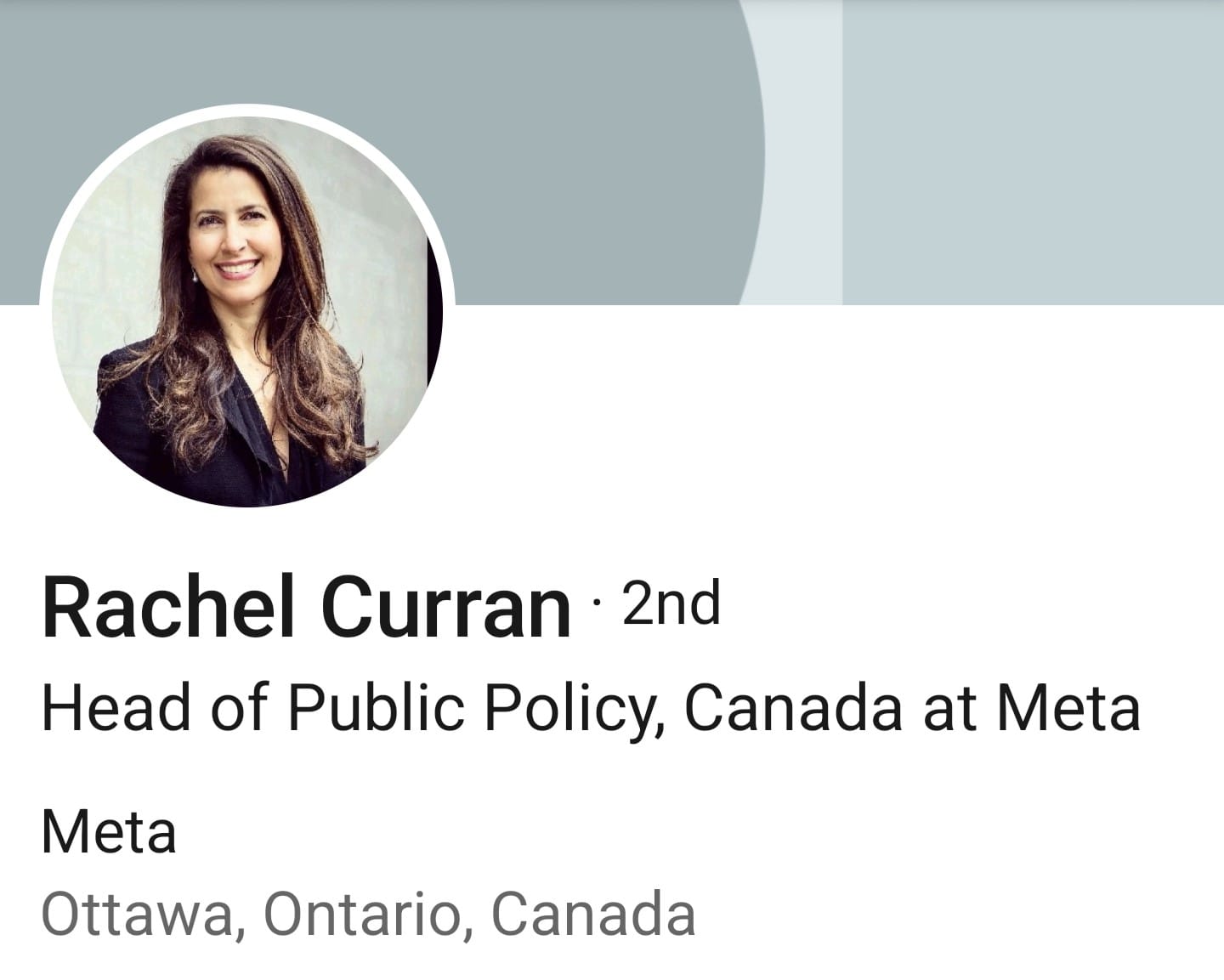
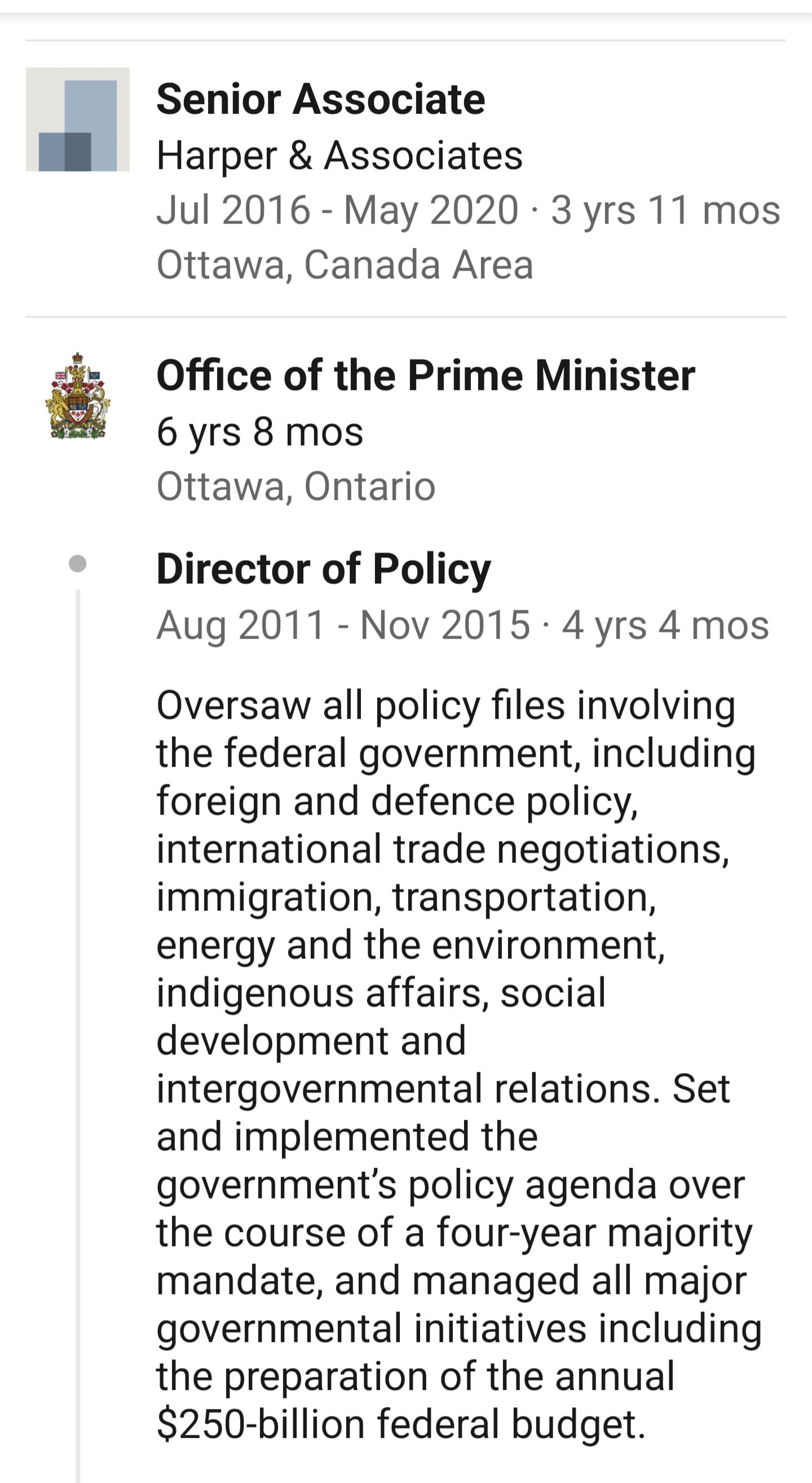
At Twitter, Michele Austin ran Twitter Canada’s public policy from 2018 to her departure in 2022, when Elon Musk took over and laid off 6,000 of the company’s employees. Austin, a Reform Party veteran, was chief of staff in the Harper government for Maxime Bernier and worked on Harper’s leadership bid in 2001.
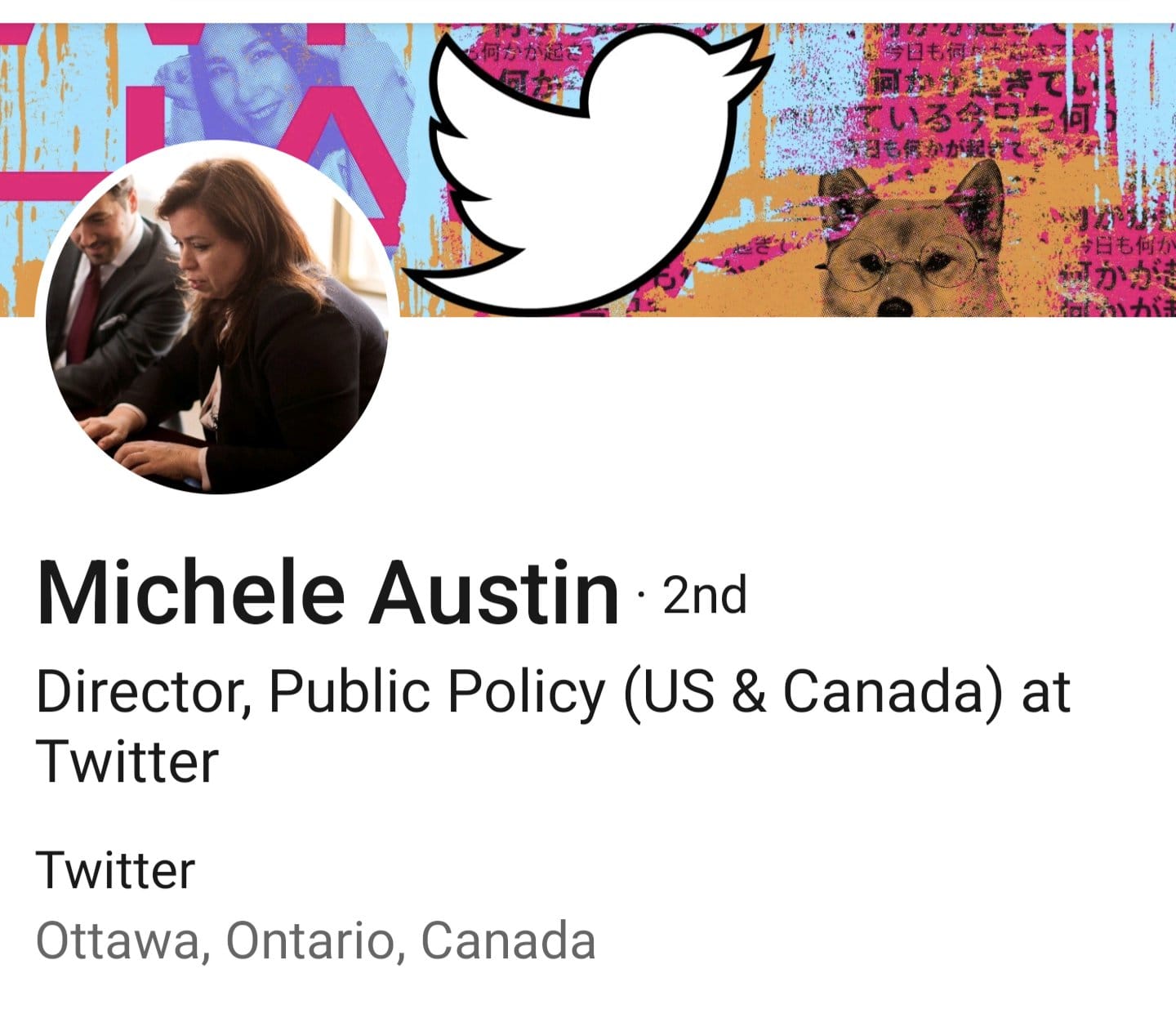
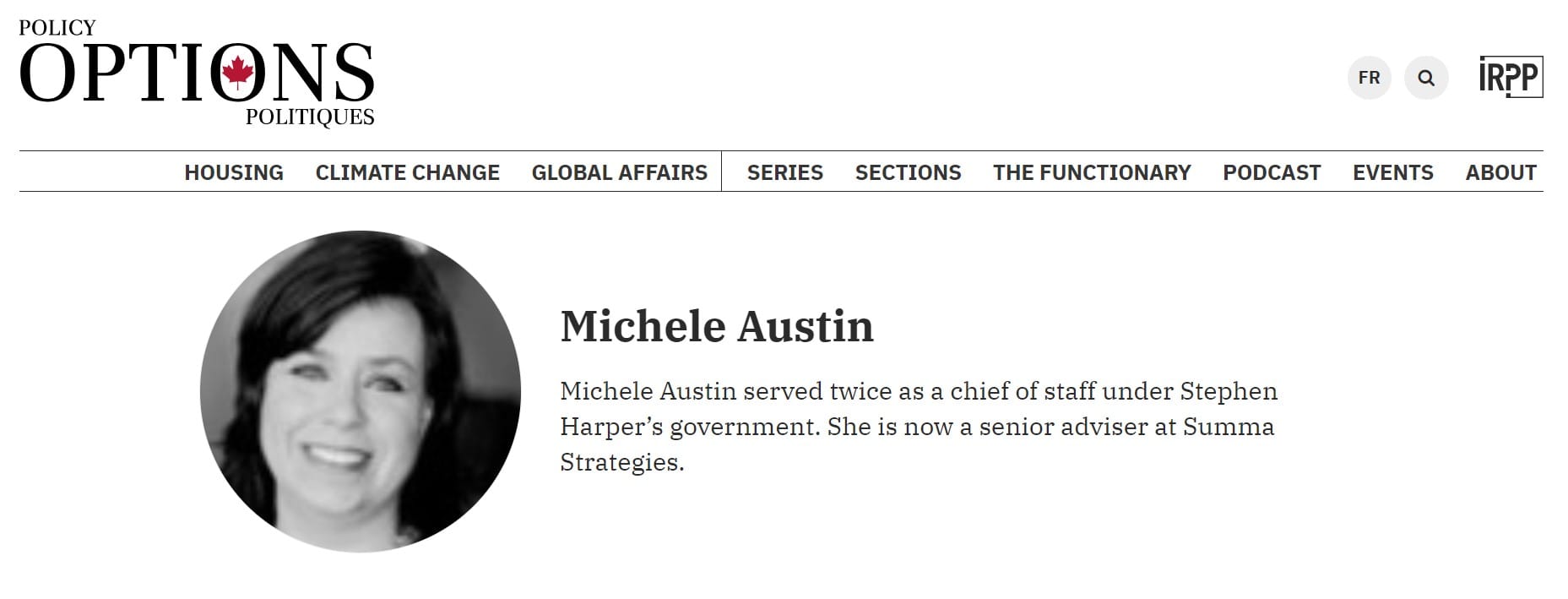
Austin was also involved in the ConservativePAC Foundation, also known as Harper PAC, a non-profit organization registered as a third party advertising vehicle. HarperPAC, which collects donations to fund its work and its advertising, bills itself as “a group of concerned Canadians looking to fight back against the flood of big union money that has been earmarked to take down the Harper government.”
HarperPAC was the creation of Stephen Taylor, fellow of the Manning Centre and a former director of the National Citizens Coalition, a conservative lobby group that supports privatization (especially of healthcare), tax cuts and government spending cuts. Stephen Harper was the president of NCC from 1998 to 2002. This week, Taylor took to Twitter to elaborate on how he used Facebook, Instagram, Twitter and geo-targeted online advertising to help conservatives win the recent byelection in Toronto - St. Paul’s.

In a tidy example of how social media can be used to influence Canadian elections, Taylor outlined how he worked with ex-spy Andrew Kirsch to register as a third party advertiser with Elections Canada for the Toronto - St. Paul’s byelection. To drive voter engagement from the Jewish community, under the banner of fighting antisemitism, Taylor and Kirsch launched “Jewish Ally” to collect personal information and donations.

Taylor and Kirsch used campaign donations to buy anti-Trudeau advertising on Facebook and Instagram, geo-targeting predominantly Jewish neighbourhoods in St. Paul’s. The collected personal information was used to support the conservative team’s “Get Out The Vote” effort. The campaign also created content that political operatives shared on Twitter and other social channels, a group that included Warren Kinsella, MP Kevin Vuong, and other Zionist supporters.
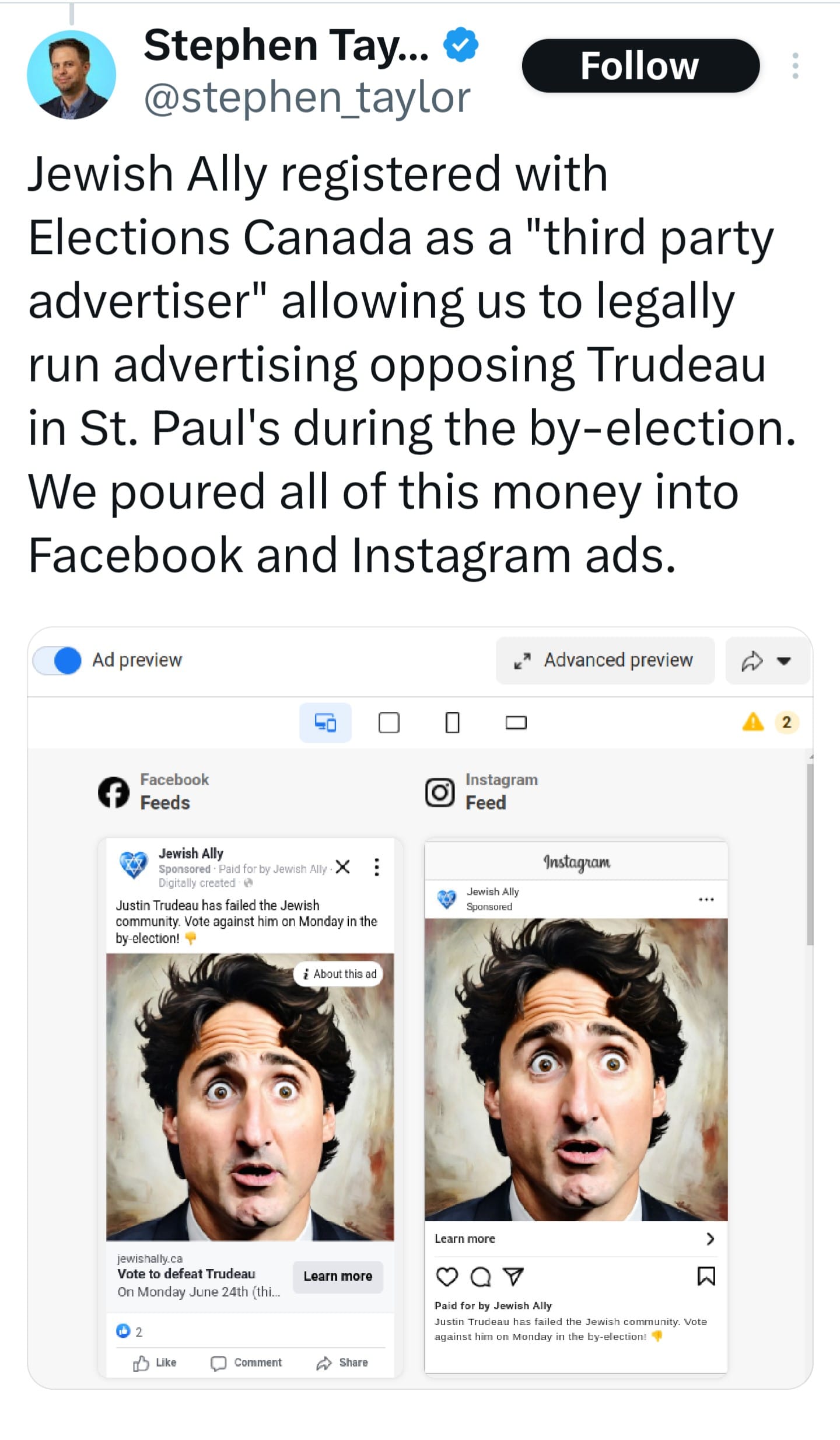
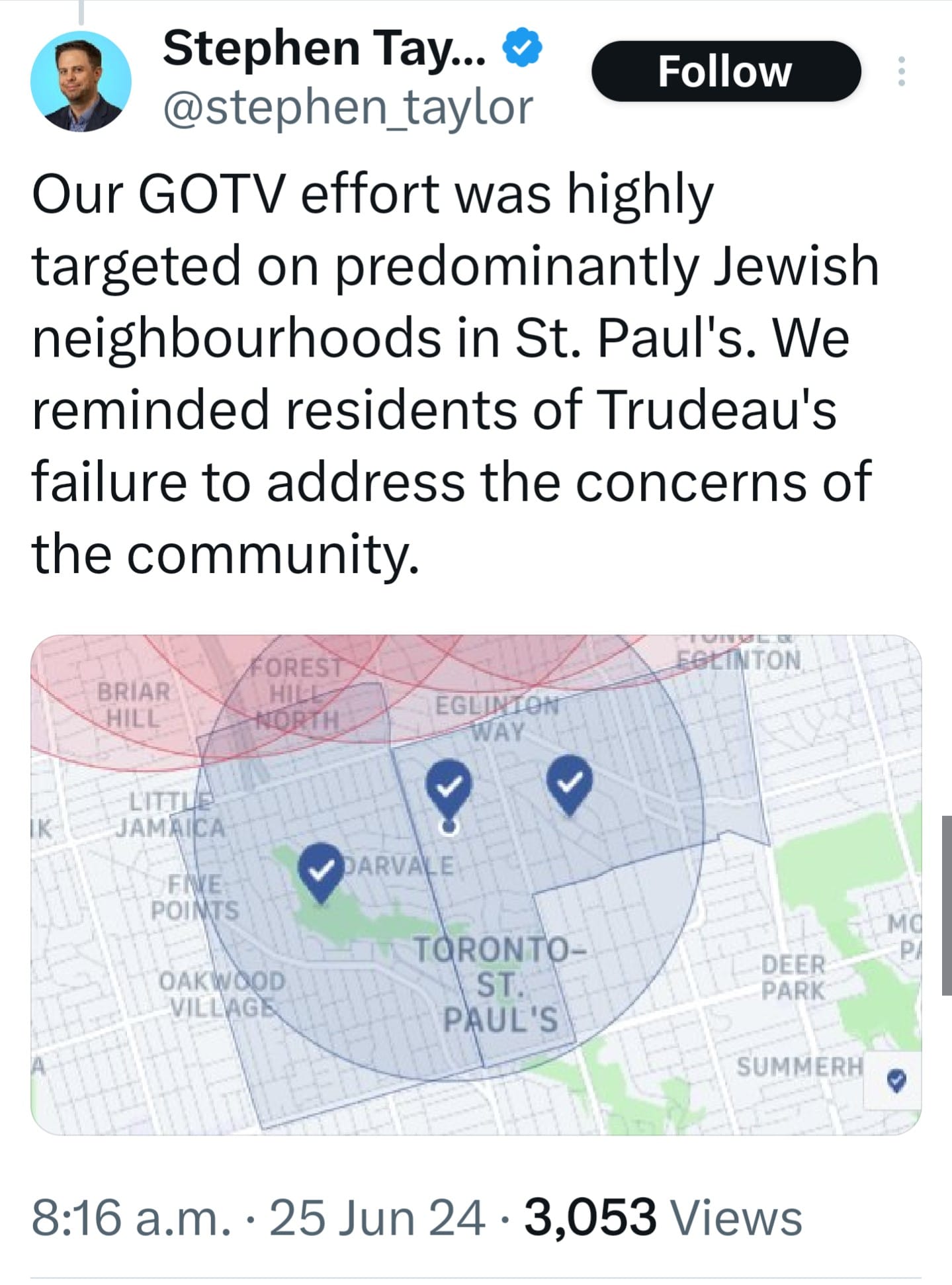
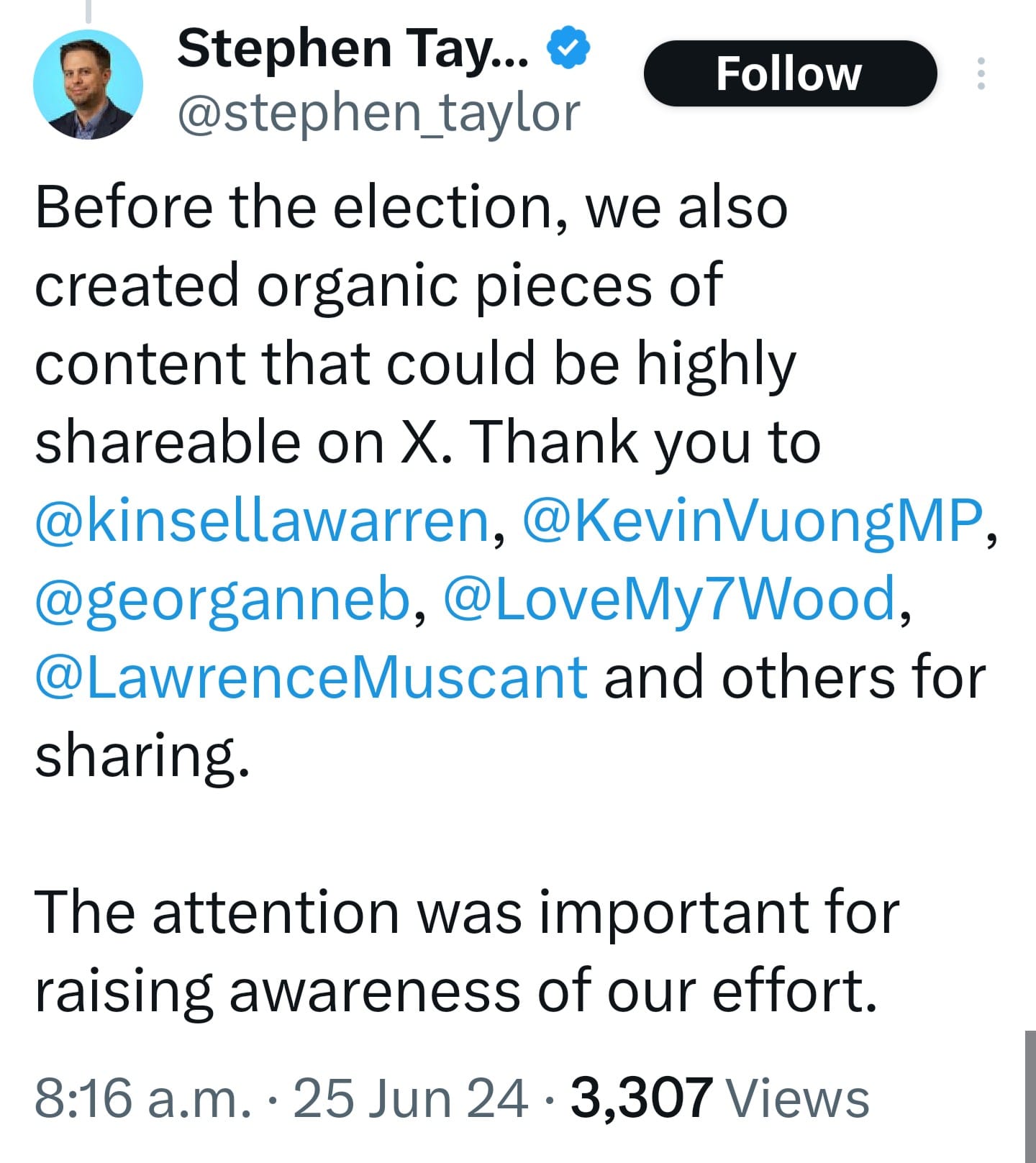
As we wrote in our article about the Ontario election of 2022, the creation of groups that look like “grassroots” voters but are really political operatives is the bread and butter of Canadian party politics. With unfettered access to spread their narrative on social platforms, few Canadians are able to tell the difference.
Which brings us back to us, and our own use of social media. We launched Corruptario as a way to share our brand of investigative reporting, as we weren’t seeing it anywhere else. However, we realized very quickly that promoting our work was going to be difficult. Google ads were repeatedly denied, and the associated email addresses were suspended from any advertising on Google. Our attempts to set up a Facebook page were shut down, and Twitter kept suspending us.

In an attempt to grow our readership, Jordan recently tried setting up a Facebook page again, as another place to post our articles, because readers were telling us they wanted to share our articles there. So far the account has been allowed to remain, but sharing any stories gets the stories removed.
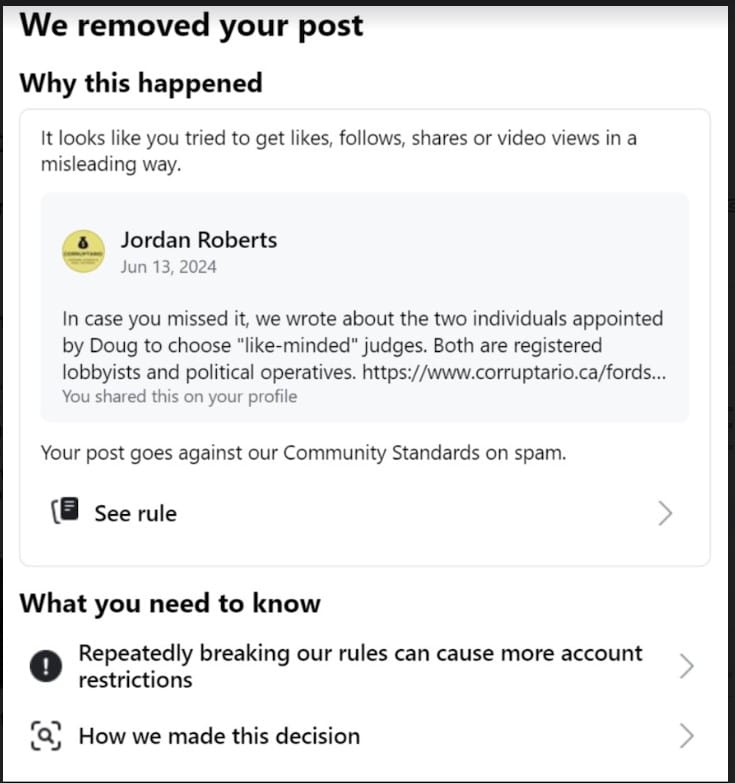
In the last few weeks, with talk of an early election in Ontario, we reshared an article we published last year on voter suppression in the 2022 Ontario election. It was immediately removed, with Facebook claiming we were posting spam.
Wondering whether the issue was the story itself or whether our account was blackballed, we asked followers on Twitter to try and share the article on their Facebook accounts. Everyone who reported back told us the article was removed as soon as they posted it. (Try sharing it on your Facebook profile, we’d love to hear what happens.)
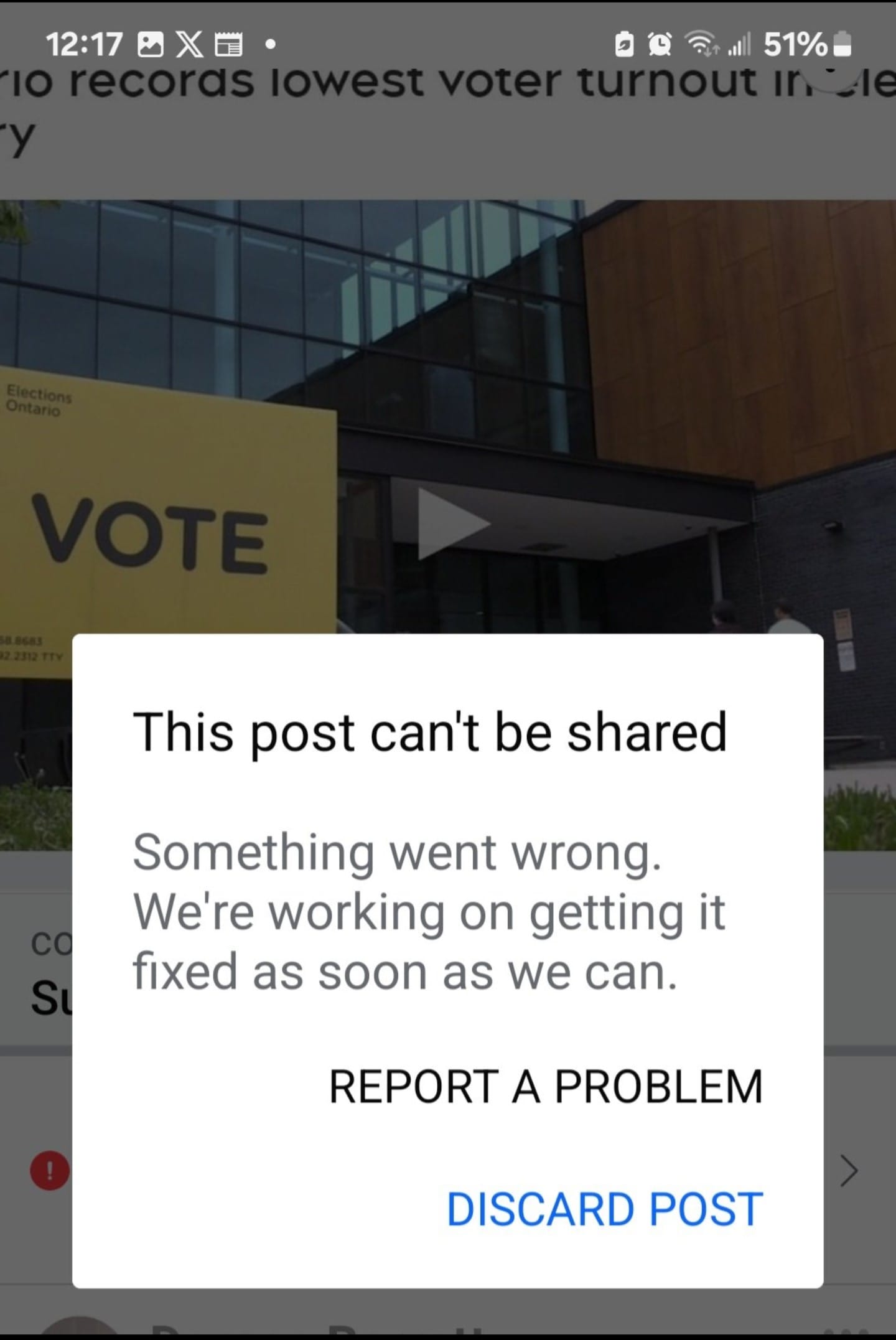
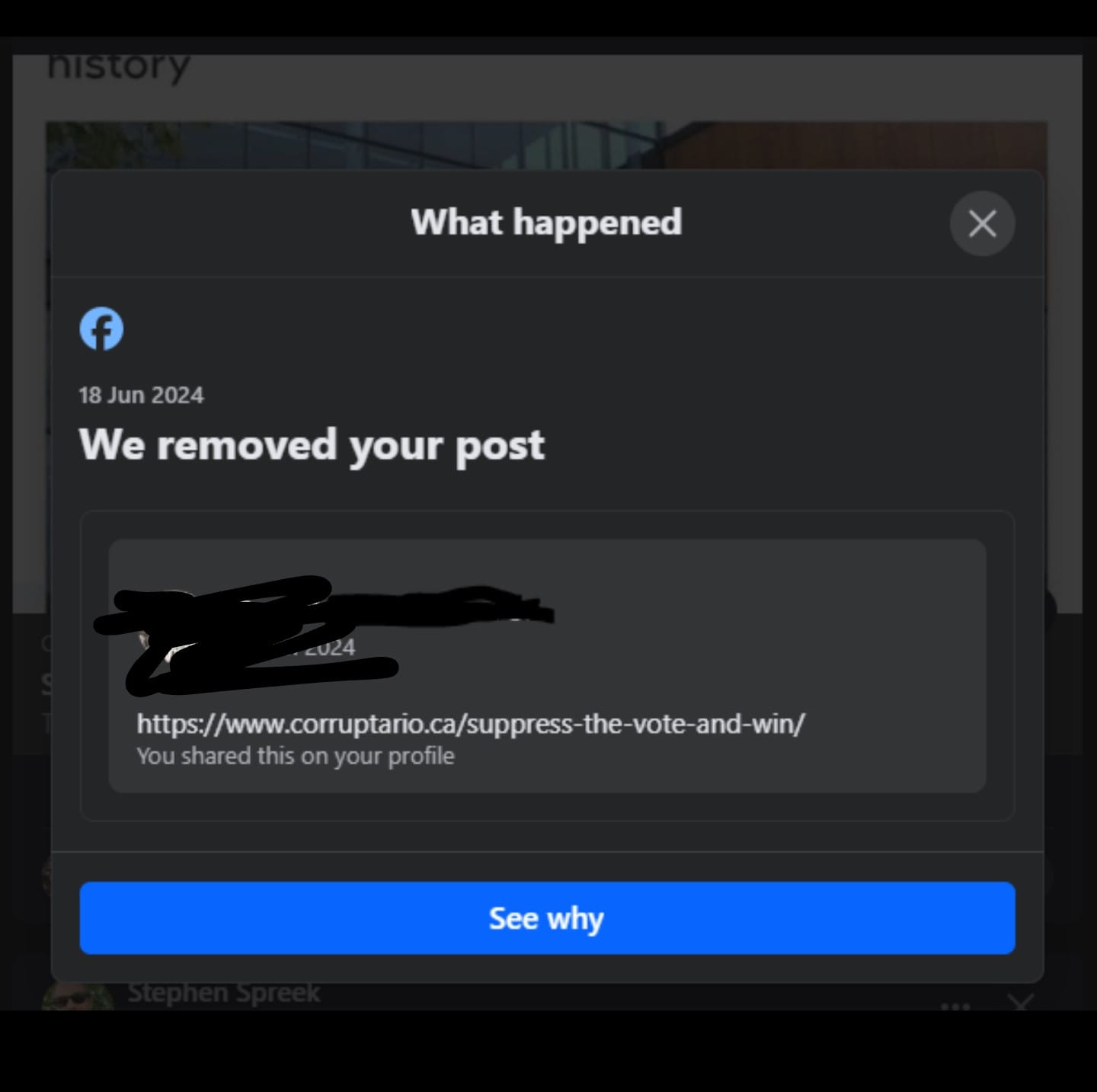
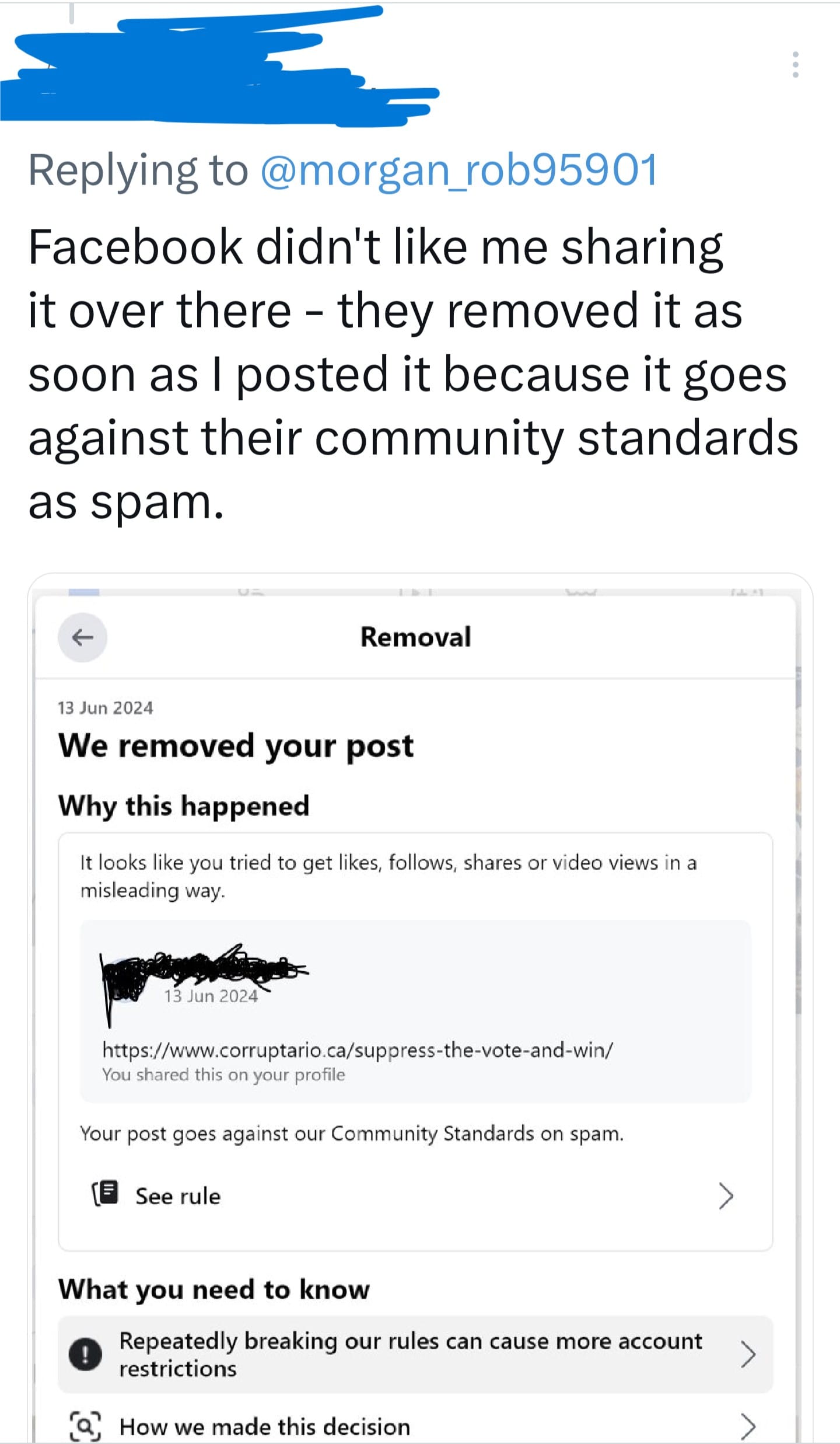
Thank you for reading Corruptario. If you appreciate our journalism, please help us by sharing our work. A paid subscription help us cover our costs and keep our articles free for anyone to read. If you really love what we do, you can leave us a tip.
If you want to follow us on other social channels, here are the places you can find us. For now.
